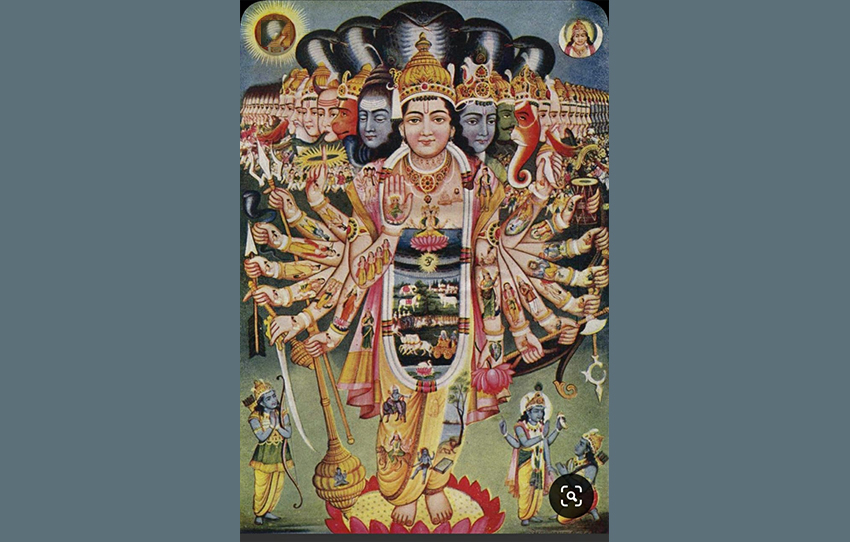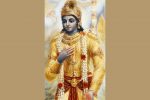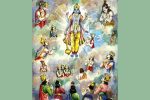NAME 34
Prabhavaḥ प्रभवः
Prabhava means excellence, the Supreme Creator. He is the source of the great elements like, ether, air, fire, water and earth. TaittirīyaUpaniṣad (II.1) says, “from the Self came space; from space, air; from air, fire’ from air, fire; from fire, water; from water, earth….” The universe evolves from Him in stages. This also endorses the theory of evolution that happens in stages.
Kṛṣṇa says, “I am the source of entire creation.” (Bhagavad Gita VII.6)
एतद्योनीनिभूतानिसर्वाणीत्युपधारय |
अहंकृत्स्नस्यजगत: प्रभव: प्रलयस्तथा || 6||
etad-yonīnibhūtānisarvāṇītyupadhāraya
ahaṁkṛitsnasyajagataḥprabhavaḥ pralayas tathā
BG 7.6: Know that all living beings are manifested by these two energies of mine. I am the source of the entire creation, and into me it again dissolves.
Living beings are a manifestation of God’s two energies, jīvaśhakti the sentient soul energy, and Maya the insentient material energy. In the material realm, all life is a combination of both matter and soul. Matter by itself is lifeless or insentient and the sentient soul needs a carrier body. Hence, both come together to form a living being.
Similarly, the entire creation is a manifestation of God’s energies. Brahma’s 100 years, complete one cycle of creation. Then the Supreme Lord dissolves this creation. The five gross elements merge into five subtle elements, which in turn merge into ahankār. Ahankār goes back into mahān, which again merges into prakṛiti. Prakṛiti now resides inside the body of Maha Vishnu (another form of the Supreme Lord). All the unliberated souls, which could not get liberated during this cycle of creation also reside in God’s body, unmanifested, waiting for the next cycle of creation.
When God decides to create, the entire cycle begins all over again (as explained under verse 7.4); and a new world comes into existence. Therefore, God is the source, the sustainer, and the resting place for the entire creation.
३४. ॐ प्रभवाय नमः।
34. Om Prabhavay Namah
Prabhavah – The One who is the very womb of all the Five Great Elements. It is That from which even the very concepts of time and space have sprung from. The Lord in Whom All Things were Born.
INTERPRETATION GUIDED BY SANT VANI (WORDS OF SAINTS)
Prabhavaḥ
The source of the elements.
He is called Prabhava because from Him alone the elements such as space(ākāsa), air(vāyu), water(āpa), fire (agni) and earth (prithvi) are all born. These five elements are the elementary building blocks at the total level. Everything else that we perceive are permutations and combinations. Every living body, post death will return to the elements whether cremated or buried or will become food for the fishes if the body is immersed in the river (like often done for sadhus), or will become manure for potatoes for one’s great great grandchildren. Humbling thought, isn’t it?
The Lord is dharmasyaprabhava, the source of dharma. Dharma is not separate from him. That I don’t want to be hurt or cheated and that the other does not want to be cheated or hurt is universal. Some people can have double standards about this, reflected in, ‘nobody should hurt me but I can hurt people from time to time. It ‘s not my fault, they drive me up the wall.’ Clearly sāmānya dharma has to be assimilated well.
If God is all powerful, how can he allow suffering and so much adharma to be there? We have to understand here that dharma is meant for the welfare of human beings. Unlike animals which are programmed, human beings have a free will and hence can abuse it and go against dharma. They can even get into destructive activities; they can destroy the environment, destroy the earth and they can even destroy themselves. Or, they can make an effort to help each other, in accordance with dharma. Their understanding of basic dharma is inhibited due to inner pressure of strong likes and dislikes fostered by asking oneself ‘What do I/he/she really want to do in the situation?’ and following through in terms of action.
We can start to ensure harmony with dharma in especially conflicting situations by asking ourselves a simple uestion and obviously answering it, ‘ What needs to be done in the situation which will be beneficial to all including myself? In time we will find that what needs to done in a given situation is also what I want to do in the situation. That reflects a lot of emotional maturity. In Buddhist teachings, what is often quoted is –Dhamamsharanamgacchaami – I surrender to dharma, the understanding of universal principles. It‘s a helpful way to approach dharma.
Sri Krsna says in the Gita, ‘bhuteṣu dharma-aviruddhahkamaḥasmi–I am, in all beings, the desire that is not opposed to dharma’ (7.11). So many people have suffered great guilt because they have been told that desires are bad. The power to desire and the very desire that we have, is the Lord. The freedom to desire is iccha-śhakti, a power and the Lord is that power. The Lord is manifest in the form of desire in the individual and if the individual goes against dharma in fulfilling his desires, then, it is not the Lord who is there, but it is the individual. But the Lord gets blamed! When, in the fulfillment of desire, the individual conforms to dharma, then there is Ishvara, because the Lord who is there in the form of dharma. If fulfillment of desires conforms to dharma, then there is more of Ishvara and very little of jīva.
Prakrṣtahbhavah, janmaasyaitiprabhavah–His taking a birth is special, exalted because, while doing so, He does not lose the knowledge about His svarupa and He is untainted by the karma that He does.



